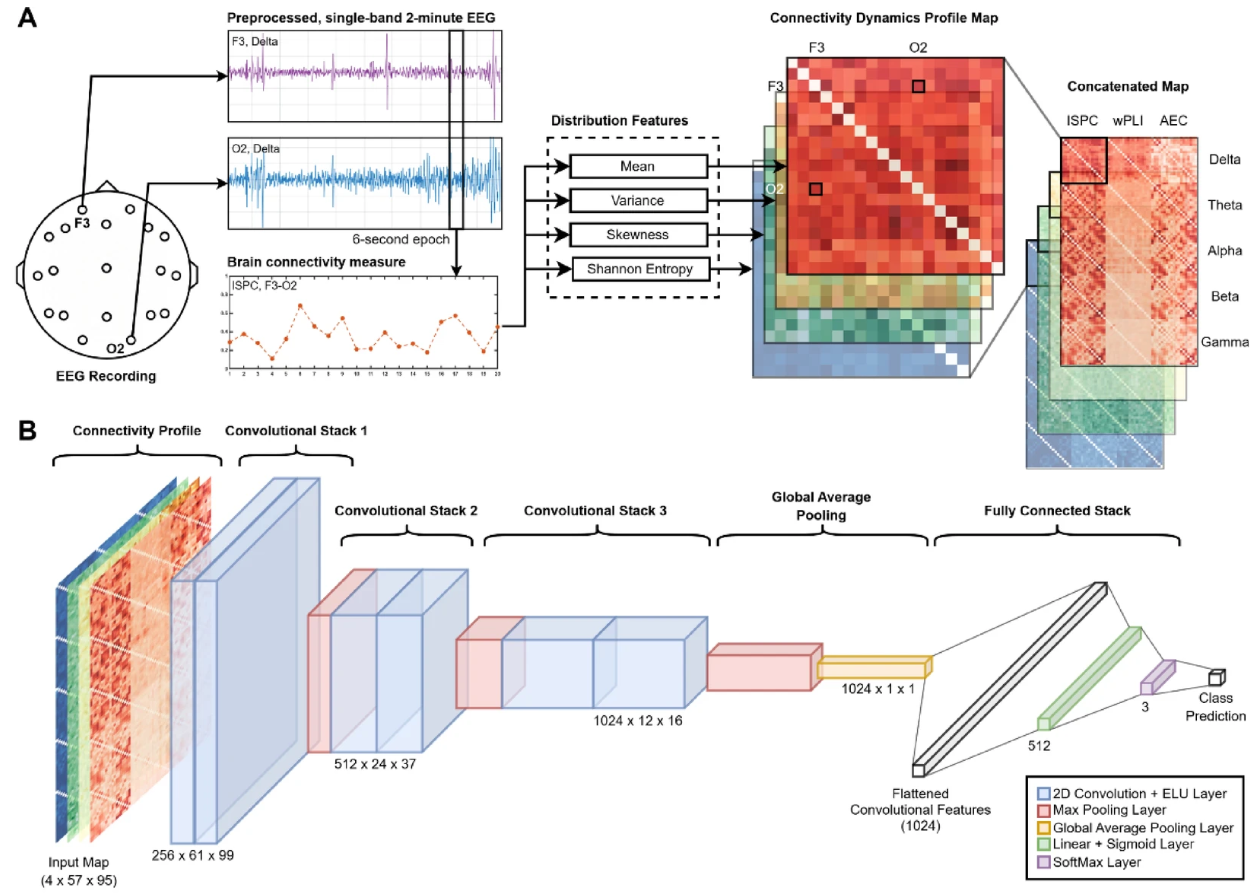We are excited to share that our latest research has been published in Scientific Reports, titled "Translational approach for dementia subtype classification using convolutional neural network based on EEG connectome dynamics" (https://www.nature.com/articles/s41598-025-02018-7).
This would not have been possible without the dedicated efforts of our team. We extend our deepest thanks to Thawirasm Jungrungrueang, Sawrawit Chairat, Kasidach Rasitanon, Praopim Limsakul, and Krit Charupanit for their contributions throughout this project.
Summary of the Study
Dementia spectrum disorders—most notably Alzheimer’s disease (AD) and frontotemporal dementia (FD)—represent a major global health challenge, with early diagnosis being crucial for effective intervention. In this study, we explored dynamic features of resting-state EEG functional connectivity to uncover subtype-specific brain network patterns.
By extracting statistical descriptors such as mean, variance, skewness, and Shannon entropy from connectivity data, we observed generalized Alpha-band connectivity disruptions common to dementia. AD cases displayed widespread Delta-band hyperconnectivity and increased complexity, while FD showed marked disruptions in phase-based connectivity across Theta, Beta, and Gamma bands.
To translate these findings into clinical utility, we implemented a convolutional neural network enhanced with these dynamic features. The model achieved impressive classification performance:
93.6% multiclass accuracy across AD, FD, and healthy controls.
97.8% accuracy distinguishing AD from healthy controls
96.7% accuracy for FD vs. healthy controls
97.4% accuracy in differentiating AD from FD
This research demonstrates the powerful potential of dynamic EEG connectivity as a non-invasive, cost-effective biomarker for early dementia diagnosis. The integration of advanced machine learning with EEG features offers a scalable solution for differentiating dementia subtypes, which is critical for tailored treatments and improving patient outcomes.
Beyond classification, our findings open new avenues for using brain network dynamics to track disease progression and personalize therapeutic strategies. We believe this work is a significant step toward making EEG-based dementia screening more accessible, accurate, and informative.
Stay tuned as we continue to explore innovative ways to harness neurotechnology for brain health.
_thumbnail.jpg)
In recent years, the integration of herbal compounds into modern medical treatments has drawn increasing attention from the global scientific community. A compelling example of this trend is the immunomodulatory role of curcumin, the active compound in turmeric, in the context of advanced cancer therapies. A new study by TrimLab@PSU, in collaboration with researchers from Peking University, China and the University of Southern California, USA, explores curcumin's potential to enhance Chimeric Antigen Receptor (CAR) T-cell therapy, a groundbreaking treatment for blood cancers.
CAR T-cell therapy has shown remarkable success in eliminating malignant cells, particularly in hematologic malignancies. However, its clinical use is often challenged by cytokine release syndrome (CRS)—a dangerous inflammatory condition triggered by excessive cytokine production. Although current treatments can help manage CRS, there remains a need for adjunctive strategies that can boost therapeutic outcomes while minimizing adverse effects.
The findings reveal that curcumin not only enhances the cytotoxicity of CAR T-cells against leukemia cells (Nalm-6) but also reduces the secretion of pro-inflammatory cytokines, such as IL-2 and IFN-γ. Using network pharmacology and molecular docking, the research team showed that curcumin targets key signaling pathways involved in T-cell function and immune regulation.
TrimLab@PSU congratulates the contributors —Praopim Limsakul, Pemikar Srifa, and Krit Charupanit (Prince of Songkla University, Thailand) Ziliang Huang, and Linshan Zhu (University of Southern California, USA), Yiqian Wu (Peking University, China)—for their dedication and interdisciplinary collaboration, which made this research possible.
These promising results suggest that curcumin could serve as a natural, safe, and effective adjunct to improve CAR T-cell therapy outcomes. This study highlights the powerful intersection of traditional herbal medicine and cutting-edge immunotherapy, reinforcing the relevance of natural compounds in the era of precision medicine.
At TrimLab, we are committed to pioneering computational biology research to develop innovative therapeutic solutions. Our latest publication, "Development of an Antibody Targeting Variants of the SARS-CoV-2 Spike Protein," addresses the challenges posed by evolving COVID-19 variants in Journal of Health Science and Medical Research.
